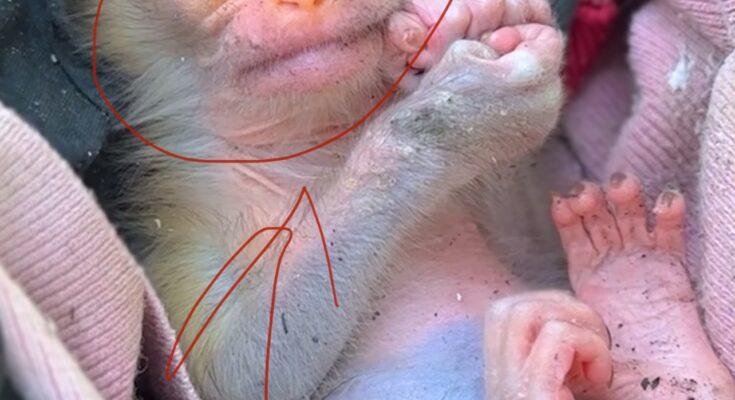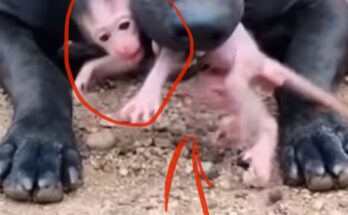In the dense green heart of a tropical forest, where sunlight filters through towering trees and the air buzzes with life, a tragedy unfolded — quiet, unnoticed, and unbearably cruel. This is the story of a little monkey, barely old enough to cling tightly to his mother’s fur, who found himself alone in a world too harsh for the innocent.
He was born into a troop of capuchin monkeys, a species known for their intelligence, complex social bonds, and nurturing family structures. Like all infants, his survival depended entirely on his mother — for milk, for warmth, for protection. But one morning, everything changed.
Poachers had entered the forest.
The gunshot was sudden. The mother fell from the treetops without a sound, her baby still clinging to her. The other monkeys scattered in panic, but the baby didn’t know fear — only confusion. He clung to her still body, waiting for her to move. She never did.
Alone and too young to fend for himself, the baby monkey remained by his mother’s side for hours, maybe days, unaware that she would never feed or comfort him again. Hunger set in quickly. He tried to nibble on leaves, then bark, then insects. But nothing worked. His tiny body wasn’t made to survive alone.
Worse, without a troop to protect him, he became vulnerable to predators — snakes, birds of prey, and even larger monkeys. He cried out, the high-pitched, heartbreaking call of a baby looking for its mother. But no one came. The jungle, once a playground, had become a hostile, endless trap.
As days passed, the little monkey grew weaker. His movements slowed, his cries softened. He curled up on a tree branch near the place where his mother died, the last of his energy spent in silence. Eventually, he stopped moving altogether.
This is not just a sad story of one monkey — it is a warning. Across the world, thousands of baby animals are orphaned every year due to human activities: poaching, deforestation, illegal wildlife trade. Most never survive.
The life of this little monkey, nameless and unseen, is a reminder that every creature plays a role in the web of life — and every loss echoes through the forest. His death, like his life, may go unnoticed by many, but it should not be forgotten.
If we care about wildlife, we must protect not only the animals themselves but also the habitats and family bonds that sustain them. Conservation is not just about numbers — it’s about stories, about lives like his.
Let his short, miserable life inspire us to act — so that no more baby monkeys have to die alone.
Call to Action:
Support local wildlife rehabilitation centers. Say no to exotic pet trade. Educate others. Every voice helps protect those who cannot speak for themselves.



